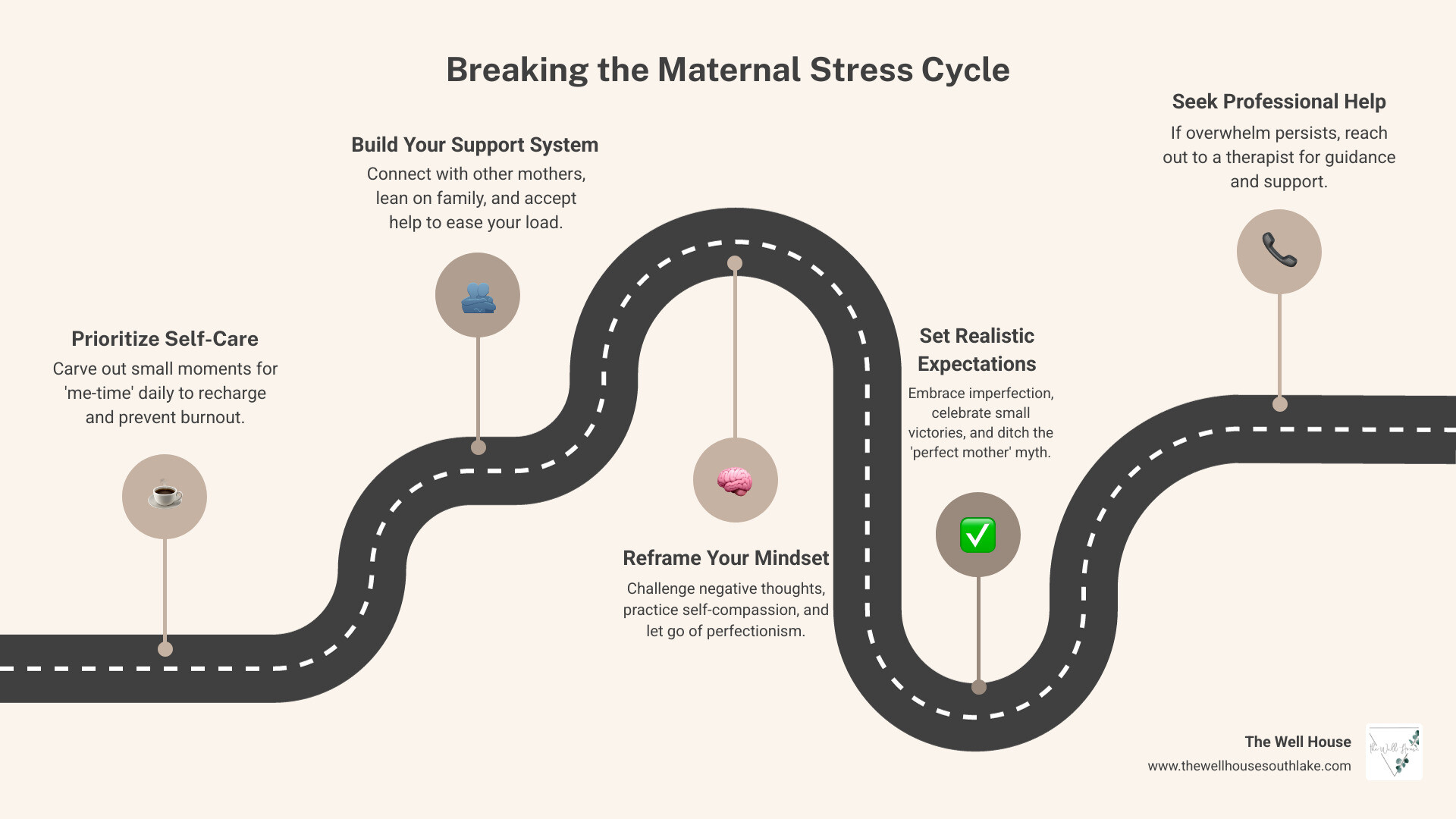Navigating Motherhood: Essential Stress Management Tips
Motherhood: A Journey of Challenges and Growth
Learning to steer and coping with motherhood can feel like an endless journey, but relief is possible. Many mothers find themselves overwhelmed, exhausted, and feeling like life is out of control.
If you’re looking for ways to cope with the stresses of motherhood, here are key strategies:
- Prioritize self-care: Even small moments of “me-time” can make a difference.
- Build your support system: Connect with other mothers, friends, and family.
- Set realistic expectations: Let go of the idea of being a “perfect” mom.
- Seek professional help: Don’t hesitate to reach out for support if you’re struggling.
Motherhood is incredibly rewarding, but it’s also undeniably hard work. Many mothers, especially new ones, often feel like they’re running on empty, burdened by constant demands, a lack of sleep, and feelings of inadequacy. These feelings are normal, and you are not alone in experiencing them. This guide will explore common challenges and provide practical, actionable strategies to help you steer this demanding yet beautiful phase of life.
As Jennifer Kruse, a Licensed Professional Counselor Supervisor, I understand the nuances of coping with motherhood through both my professional practice and personal experience as a mother of three energetic children. My approach emphasizes holistic healing, supporting mothers in refinding their inner strengths and finding peace amidst life’s demands.

Quick coping with motherhood terms:
Understanding the Unique Challenges of Motherhood
Motherhood is a truly profound shift, bringing with it immense joy but also a unique set of challenges. It’s a time of intense change that touches every part of you — your body, your mind, your social life, and even your deepest sense of self. This isn’t just about recovering physically from childbirth; it’s a complete change of your identity, a process we call “matrescence.”
Often, society expects mothers to be “superheroes” who can effortlessly “do it all.” This “perfect mother” myth, often seen through the filtered lens of social media, sets an impossible standard. The truth is, modern motherhood can feel incredibly isolating and overwhelming because we often lack the community support that humans traditionally relied on to raise children. This pressure contributes greatly to what’s known as parental burnout or “Depleted Mother Syndrome.” It happens when the constant demands of being a parent simply outweigh a mother’s ability to cope, leading to exhaustion, guilt, irritability, and a feeling of emotional detachment.
The Reality of Sleep Deprivation and Fatigue
One of the most common and toughest challenges new mothers face is sleep deprivation. It’s so much more than just feeling tired. Chronic fatigue can make stress much worse and deeply affect both your physical and mental health. It can lead to irritability, trouble concentrating, and can even trigger depression. Simply put, getting enough restorative sleep is absolutely vital for a healthy brain.
Beyond the mental toll, your body is also going through a significant recovery from childbirth. Studies suggest that women need six to nine months to fully recover from labor and delivery – much longer than the typical six-week check-up. This extended physical healing, combined with the constant needs of a newborn and the rollercoaster of hormonal changes, means many mothers are running on fumes. They often struggle with clear thinking and managing their emotions. It’s no wonder so many feel completely drained by the end of the day, even with all the love they feel for their child.
At The Well House, we truly understand how much sleep deprivation impacts your well-being. Our holistic approach to support for moms looks at all aspects of your health. We help you find practical ways to manage fatigue and its effects. We believe that addressing this basic need is key to your overall mental and physical health. For more scientific information on maternal stress and sleep, you can check out this research: Scientific research on maternal stress and sleep.
Navigating Your New Identity and ‘Motherhood Imposter Syndrome’
As we’ve touched upon, becoming a mother, or “matrescence,” involves a huge shift in who you are. You might feel a “loss of your old self” and wonder where you fit in outside of your new role as a mom. This feeling is completely normal and valid. This journey can shake up your entire sense of self and purpose.
On top of this identity shift, many moms experience “motherhood imposter syndrome.” This isn’t just a little self-doubt; it’s a constant feeling that you’re failing your child, that you’re not a good enough mother, or that you’ll never truly meet their needs. It leads to endless self-doubt and the chase for a mythical, perfect standard of motherhood. Social media, with its carefully curated “Pinterest Mom” images, often makes these feelings worse, making it easy to compare yourself to an unrealistic picture of parenting.
Overcoming this self-doubt starts with seeing these feelings for what they are: real emotions that don’t necessarily reflect the truth of your abilities. We encourage you to acknowledge these feelings without believing them as absolute facts. It’s also vital to set realistic expectations for yourself and avoid the trap of comparing yourself to others. Being a good mom doesn’t mean doing everything perfectly or by yourself.
At The Well House, we offer guidance and support to help you cope with motherhood by navigating this new identity and overcoming “motherhood imposter syndrome.” Our caring counselors provide a safe space where you can explore these feelings, challenge negative thoughts, and build confidence in your unique parenting journey.
The Strain on Relationships
The arrival of a child fundamentally changes your existing relationships, especially with your partner. It’s common for relationship satisfaction to dip after a baby joins the family. This isn’t a sign of failure, but a normal challenge as your priorities shift and new demands arise.
Often, the “mental load” of managing household and family life falls heavily on mothers. This includes all the invisible details – from doctor’s appointments and birthday parties to meal planning and school schedules. This can lead to communication challenges, as one partner feels overwhelmed and the other might not fully grasp the weight of the burden. It’s easy to feel disconnected, to miss the “us” time you once shared, and to find yourselves disagreeing over parenting choices or household chores.
However, conflict in relationships is a natural part of two unique people sharing a life. It’s not always a sign of weakness. When handled well, it can actually be a chance for growth and a deeper connection. Open and honest communication about your feelings and needs is key. This means truly listening, using “I” statements to express your concerns (“I feel upset when this happens” instead of “You always…”), and trying to see things from your partner’s perspective. Even small moments, like falling asleep together on the couch, can help keep your connection strong.
At The Well House, we offer dedicated support for couples and families. Our counselors can help you steer these communication challenges, share the mental load more fairly, and strengthen your relationship as you transition into this new phase of family life. We believe in helping you build healthier, more supportive partnerships where both individuals feel seen, heard, and valued.
Practical Strategies for Coping with Motherhood Stress
Now that we’ve explored the unique challenges of coping with motherhood, let’s dive into practical strategies. These are actionable tips, many of which involve small changes that can make a big difference in prioritizing your well-being and regaining a sense of control.
Prioritizing Self-Care (Even When It Feels Impossible)
You’ve heard it before: “You can’t pour from an empty cup.” Yet, for many mothers, the idea of self-care feels like another item on an already overflowing to-do list. We understand. But here’s the truth: prioritizing self-care isn’t selfish; it’s essential for your emotional well-being and for being the best mother you can be. It’s good modeling for your child to show them that you are important enough to take care of yourself.
Even when time is extremely limited, “micro-self-care” can make a huge difference. These are 5-minute breaks or small acts that recharge you. Committing early to things that make you characteristically happy is important, and not refusing yourself brief opportunities to indulge will keep you actively engaged.
Here’s a list of simple self-care ideas for busy moms:
- Take 5 deep breaths: Inhale slowly, hold, and exhale completely. This can be done anywhere, anytime.
- Listen to one favorite song: Put on headphones and truly immerse yourself in the music.
- Enjoy a hot beverage mindfully: Sip your tea or coffee, focusing on its warmth and taste.
- Step outside for 2 minutes: Feel the sun on your face, take a deep breath of fresh air.
- Stretch your body: A quick neck roll or shoulder stretch can release tension.
- Read one page of a book: Keep a book handy for tiny pockets of time.
- Do a quick tidy of one small area: Sometimes, reducing visual clutter can reduce mental clutter.
- Write down one thing you’re grateful for: A quick gratitude practice can shift your perspective.
- Prioritize physical health: Getting enough sleep, eating nutritious meals, and engaging in regular physical activity are fundamental to managing stress. Even a short walk can boost your mood and help you reconnect with your body.
Self-care doesn’t have to be grand gestures. It’s about consistently making small choices that replenish your energy and mental reserves.
Reframing Your Mindset: A Key to Coping with Motherhood
Our thoughts significantly impact our feelings. Coping with motherhood often involves challenging negative self-talk and cultivating a more compassionate inner voice. When you find yourself thinking, “I hate being a mom,” or “I’m not good enough,” pause and consider what you would say to a friend in the same situation. Would you be so harsh? Likely not.
Practicing self-compassion means treating yourself with the same kindness and understanding you would offer a loved one. It involves acknowledging your feelings without judgment. It’s okay to feel overwhelmed, frustrated, or even regretful in moments of intense stress – these are normal human emotions.
Letting go of perfection is perhaps one of the most liberating steps in motherhood. The idea that “every day is going to be perfect is a setup.” Accept imperfections as a natural part of the parenting journey. A messy house doesn’t mean you’re failing; it often means you’re busy loving and raising tiny humans. Focus on progress, not perfection. Celebrate accomplishments, no matter how small – whether it’s getting everyone fed, having a moment of connection with your child, or simply making it through the day. Setting realistic expectations for yourself and your family is crucial for your mental well-being.
Mindfulness and Relaxation Techniques
In the whirlwind of motherhood, finding moments of calm can seem impossible. However, incorporating mindfulness and relaxation techniques into your daily routine can significantly reduce stress and improve your overall well-being. Our research highlights that mindfulness is known to lower cortisol, your body’s primary stress hormone. Even small, imperfect moments of mindfulness can help in times of overwhelm.
Here are some techniques you can try:
- Deep Breathing Exercises: When you feel overwhelmed, take a few slow, deep breaths. Inhale through your nose, letting your belly expand, hold for a few seconds, and then slowly exhale through your mouth. This simple act can calm your nervous system almost instantly.
- Guided Meditation: There are many free apps and online resources that offer short guided meditations specifically for busy parents. Even 5-10 minutes can make a difference.
- Mindful Moments: Integrate mindfulness into everyday tasks. When you’re feeding your baby, focus on their expressions, the warmth of their body, or the sounds they make. When you’re washing dishes, notice the feel of the water, the scent of the soap. These small shifts can bring you back to the present moment.
- Grounding Techniques: If anxiety or overwhelm feels consuming, try a grounding technique like the “5-4-3-2-1” method: name 5 things you can see, 4 things you can feel, 3 things you can hear, 2 things you can smell, and 1 thing you can taste.
- Gentle Movement: Brief yoga sessions or stretching can also be a form of moving meditation, helping to release physical tension and calm your mind.
These practices aren’t about clearing your mind completely, but about observing your thoughts and feelings without judgment, creating a little space between you and your stress.
Building Your Support System & Knowing When to Get Help
One of the deepest truths about coping with motherhood is that you were never, ever meant to do it all alone. Think of the old saying, “It takes a village to raise a child.” Well, it takes a village to support a mother too! Having a network of people who genuinely “get it” can offer both practical help and much-needed emotional understanding. It’s so easy to feel isolated when you’re deep in the trenches of motherhood, but sharing your experiences with others helps to bust the myth of perfect, idyllic motherhood. You’ll quickly realize you’re not the only one feeling overwhelmed, and that can be a huge relief.
Building Your Village: A Crucial Step in Coping with Motherhood
Creating a strong support system is truly one of the most powerful things you can do to steer the ups and downs of motherhood. This “village” is made up of the people who lift you up and lend a hand. How do you build one?
Start by connecting with other moms. This could mean joining local mom groups, attending playdates, or even finding online forums where you can chat with others who understand your daily life. Sharing your triumphs and struggles with those who truly “get it” can be incredibly validating and make you feel less alone.
Don’t be afraid to lean on family and friends. This is a big one! Whether it’s a home-cooked meal dropped off at your door, an hour to run errands while they watch the baby, or simply a listening ear when you need to vent, accepting help is a sign of wisdom and strength, not weakness. You truly cannot do everything by yourself.
Consider delegating tasks where you can. If you have a partner, open and honest communication about sharing household and childcare duties is key. And if it’s within your means, even occasionally hiring help for cleaning or childcare can make a world of difference. Sometimes, just asking a visiting friend to throw in a load of laundry can feel like a huge win!
Finally, explore community resources. Many local centers, libraries, and parenting organizations offer support groups, classes, or events designed to connect you with other parents in your area. Building your village takes a bit of effort, reaching out and being vulnerable, but allowing others to support you is truly an act of self-care.
When to Seek Professional Help
While feeling overwhelmed and stressed is a very common part of motherhood, there are times when professional help becomes necessary. Reaching out for support isn’t a sign of failure; it’s a courageous step towards taking care of yourself and your family.
You might benefit from professional support if you experience:
- Persistent feelings of sadness or emptiness that last for more than a couple of weeks after childbirth, or if they feel intense and stop you from enjoying your daily life.
- Frequent, uncontrollable crying spells that seem to come out of nowhere.
- Overwhelming anxiety or panic attacks, where you feel constantly on edge or experience sudden, intense bouts of fear.
- Intense anger or irritability, often directed at your partner or even your children. This “mommy rage” can be a clear sign that your own needs aren’t being met.
- Difficulty bonding with your baby, feeling detached or indifferent towards them.
- Significant changes in your sleep or appetite, like being unable to sleep even when the baby is sleeping, or sleeping far too much; or major weight loss or gain.
- Trouble functioning in daily life, finding it hard to do basic tasks, neglecting your own self-care, or pulling away from social interactions.
- Using substances like alcohol or drugs as your main way of coping with emotions.
- Thoughts of harming yourself or your baby. These are urgent signs that require immediate professional intervention. Please seek help right away.
It’s important to know the difference between the “baby blues” (which are common, fleeting mood swings in the first two weeks postpartum) and more serious, persistent conditions like postpartum depression or anxiety. The good news is that depression is a very treatable mental illness. Research clearly shows that mothers who receive psychotherapy often fare better, and their children benefit greatly from their hard work towards healing. Plus, online therapy has proven to be just as effective as in-person sessions, offering a convenient and accessible option for busy moms.
At The Well House, we offer compassionate and personalized Therapy for Moms at The Well House in Southlake, TX, and surrounding areas like Westlake, Grapevine, Roanoke, and Trophy Club. We also provide convenient Online Counseling and Therapy at The Well House throughout Texas, so you can access support from the comfort of your home. Our diverse team specializes in helping you find wellness for your mind, body, and spirit, providing holistic care custom to your unique needs. We are here to help you steer these challenges and find your path to well-being.
Frequently Asked Questions about Coping with Motherhood
What is ‘matrescence’ and why is it important to understand?
Think of matrescence as the “adolescence” of motherhood – it’s that profound, sometimes messy transition into becoming a mother. Medical anthropologist Dana Raphael first coined this term, and it’s gained recognition because it perfectly captures what so many women experience but struggle to name.
Just like adolescence, matrescence involves massive changes in your body, mind, relationships, and even your sense of purpose. Your brain is literally rewiring itself, your hormones are shifting, and you’re figuring out who you are in this new role. It’s no wonder you might feel like you’re going through an identity crisis!
Understanding matrescence is incredibly important because it validates your experience. When you’re feeling overwhelmed, confused, or like you’ve lost yourself, knowing that this is a normal developmental phase – not a personal failing – can be deeply reassuring. It helps you approach this time with more self-compassion rather than self-criticism.
This isn’t about losing your old self; it’s about evolving into a new version of yourself. And just like adolescence, it takes time to settle into who you’re becoming.
How can I manage guilt when I take time for myself?
Ah, the guilt – it’s practically a rite of passage in motherhood, isn’t it? That nagging voice that whispers “selfish” every time you want five minutes to yourself. Let’s tackle this head-on.
First, let’s reframe self-care entirely. Taking care of yourself isn’t selfish – it’s essential maintenance. Think of it like the airplane oxygen mask rule: you put yours on first so you can help others. When you’re running on empty, everyone in your family feels it.
The truth is, you’re modeling healthy behavior for your children. When they see you prioritizing your well-being, you’re teaching them that they matter too. You’re showing them what it looks like to have healthy boundaries and self-respect.
Try communicating your needs clearly to your partner and support system. Explain that your self-care time isn’t a luxury – it’s what helps you be more patient, present, and emotionally available for your family. Most people want to support you; they just need to understand why it matters.
The “perfect mother” myth is exactly that – a myth. Real mothers need breaks, have bad days, and sometimes need to step away to recharge. That’s not failing; that’s being human.
What’s the difference between the ‘baby blues’ and postpartum depression?
This is such an important distinction, and one that many new mothers wonder about. Let me break it down in a way that’s easy to understand.
The “baby blues” are incredibly common – affecting up to 80% of new mothers. These typically show up a few days after birth and involve mood swings, weepiness, anxiety, and feeling overwhelmed. The key thing about baby blues is that they’re mild and temporary, usually resolving on their own within two weeks as your hormones start to stabilize.
Postpartum depression (PPD) is a different beast entirely. It’s more intense, lasts much longer (beyond two weeks), and can actually start anytime within the first year after having your baby. With PPD, you might experience persistent sadness, severe anxiety or panic attacks, intense anger, trouble bonding with your baby, or significant changes in your sleep and appetite.
The biggest difference? PPD significantly interferes with your daily life. You might struggle to care for yourself or your baby, feel disconnected from everything you once enjoyed, or have overwhelming feelings of worthlessness or guilt.
Here’s what’s crucial to understand: PPD is highly treatable. It’s not a character flaw or something you need to “tough out.” If you’re experiencing symptoms that feel overwhelming or persistent, please reach out for help. At The Well House, we specialize in supporting mothers through these challenges with both our Therapy for Moms services and convenient Online Counseling and Therapy options.
If you’re having thoughts of harming yourself or your baby, please seek immediate professional help. You deserve support, and coping with motherhood doesn’t mean you have to struggle alone.
Insurance & Payment Options at The Well House Southlake
At The Well House Southlake, we believe that quality mental health care should be both accessible and affordable. Whether you’re seeking therapy, couples counseling, or online sessions, our goal is to make it easy for you to access therapy that takes insurance and supports your unique needs.
We currently accept:
- Blue Cross Blue Shield (BCBS)
- Aetna
- United Health care (UHC)
- Self-Pay and Out-of-Network Options
If you’re exploring counseling that takes insurance or need help verifying your coverage, our team will guide you through each step — from confirming your benefits to booking your first session. We’re committed to making your experience simple and stress-free, so you can focus on what matters most: your well-being.
Conclusion
Coping with motherhood is truly a journey like no other. It’s a path brimming with immense love and profound growth, yet it’s also undeniably challenging. We’ve walked through some of the common problems together, from the sheer exhaustion of sleep deprivation and the bewildering shifts in identity, to the strains on relationships and the heavy weight of societal expectations. It’s a lot to steer, and feeling overwhelmed is a perfectly normal response.
But here’s the good news: you have powerful tools at your fingertips. We’ve explored practical strategies that can make a real difference:
- Prioritizing self-care, even in tiny, consistent ways, isn’t selfish—it’s essential.
- Reframing your mindset helps you accept self-compassion and let go of the quest for perfection.
- Mindfulness and relaxation techniques can be your secret weapons for finding calm amidst the daily chaos.
You are absolutely not alone in these feelings. Motherhood was never meant to be a solo mission. Building your village—connecting with other moms, leaning on family and friends, and gracefully accepting help—is a vital step in lightening your load. And most importantly, recognizing when you need professional help is a profound act of self-love and a true sign of strength. If persistent overwhelm, anxiety, or depression linger, reaching out is the most courageous step you can take.
Motherhood is indeed a marathon, not a sprint. There will be days filled with pure joy and others that test every ounce of your patience. Through it all, please know this: you are doing enough. You are a wonderful mother, navigating one of life’s most incredible changes. We at The Well House are here to walk alongside you, offering compassionate and holistic care custom to your unique journey.














